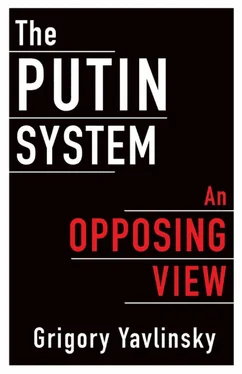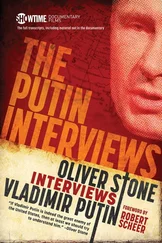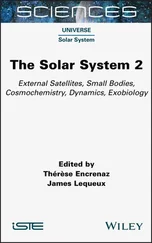At the same time, by insulating Russia from the global capitalist core—in political and, therefore, in economic terms—its authoritarianism transforms itself into a parochial regime. From being on the outskirts of a large metropolis, with every opportunity to become a part of it and thus to gain a voice in its governance system, this regime tries to turn itself into an obscure village, about which the metropolis essentially couldn’t care less.
Granted, no one will interfere with the regime’s distinctive way of life within this village, which is based on its own mental structure—even if this means the way of life and the mores of many centuries ago, where might makes right, where the weaker members of society have no rights at all, and where anything that moves or even stirs without permission from the powers that be gets suppressed. But neither will anyone let this regime interfere with the life of the global city from now on, whether directly or not, whether by economic coercion or by armed force—if the regime even manages to maintain such a force.
Indeed, the authoritarian regime that is taking shape in today’s Russia is not just a peripheral-type but also a parochial one. It exults in its peripheral position and strives to stabilize it for the sake of maintaining power in the hands of the currently ruling group. It takes the territory under its control out of the global developmental process while consciously pitting itself against the forces of global governance and trumpeting its disagreement with the principles on which this governance was built after World War II. One such principle is the principle of the ladder of power and responsibility, according to which anyone’s claims to be a force that shapes the rules of international behavior must be backed up by the economic, financial, and organizational capabilities that match this role.
Thus, the path toward upgrading one’s status within the system of global governance lies precisely in building up these capabilities instead of ditching the rules because they have been set up by someone else. After all, these rules, which had taken a more or less steady form by the end of the twentieth century, emerged as the outcome and the product of numerous wars waged over many centuries by European powers striving to validate their respective exceptionalisms. These wars crushed tens of millions of human lives and destroyed untold fruits of their labor. And this unwritten code of rules, soaked in human blood, will not be amended to fit the ambitions and the notions of justice held by a single national leader, or even a group of such leaders who are unhappy with their present status in the world community.
A parochial authoritarianism in its Russian avatar acts differently; it seeks to demonstrate to the entire world its own, different rules of existence. It is narrow-mindedly confident that this is just the way everything has worked, everywhere, from time immemorial to our days and into the foreseeable future. It aspires to maintain these rules unconditionally within its domain, whose boundaries it arbitrarily redefines as it sees fit. In our specific case, the “Russian world” is just a euphemistic name for a province that includes Russia’s full expanse throughout its history. However, in practice it is not feasible to make these rules “legit” on a global scale.
Granted, Russia has considerable military capability, especially taking its nuclear stockpiles into account. Yet its economic capabilities are extremely limited, regardless of its huge territory and abundant natural resources (which do not necessarily or always provide an economic advantage to their owners). At present, moreover, the use of so-called soft or smart power—the power that capitalizes upon society’s cultural and intellectual resources—is out of the question for Russia. In this regard, the global periphery is never able to compete with the center, just as a village cannot compete with a city and an area of massive impoverishment cannot compete with a consumer society. Finally, the periphery’s propaganda is ineffective, even if the media tools that it uses are up to date. This propaganda is not in the least capable of defining a message in the global media mainstream and it therefore turns into a senseless waste of already scarce resources, squandered upon building castles in the air and fooling one’s own population.
The outcome of all these efforts isn’t difficult to predict. The logic of the development of a parochial authoritarianism drives it further and further from global politics, toward self-isolation, toward dealing solely with itself, with a clear-cut prospect of a collapse through implosion. Objectively speaking, moving off of this path is a necessity not only for Russia’s society as a whole but also for its political class—and even for the authoritarian regime itself, whose lot will be quite unenviable if the ongoing trends continue.
And the key question, the answer to which will determine our future, is the following: Will Russia’s political elite and intellectual class be able to find and mobilize its internal power to turn these currently dominant trends around, to try to put the country’s trajectory back into the global context, to find a worthy place and a future for Russia there?
THE NEW CAST OF RUSSIA’S AUTHORITARIANISM
Taken together, the trends that I have described have been shaping the new look of Russia’s authoritarianism. Its form, here and now, is a logical extension of its preexisting features, but these features are today of a different caliber, due to the hardened external conditions in Russia, the first and foremost being the narrowing range of economic opportunities. In its turn, this shrinking of opportunities was an unavoidable outcome of the peripheral character of Russia’s capitalism. The overall slowdown of the growth of the world economy, and the increasingly pronounced distancing of its core from industries and areas of economic activity that had been traditional for it, have complicated the functioning of the economies of the capitalist periphery, including the Russian economy. These economies have no opportunity and no resources to reorient themselves toward the industries that provide more dynamism and a better return on their expenditures. As a result, they are becoming less efficient and are facing a decline in revenues and in capabilities—as well as growing dissatisfaction on the part of the most energetic and ambitious strata of society. These people either begin to look for employment opportunities abroad, on a mass scale, or they express their discontent in whatever ways they can.
Furthermore, the growing problems and constraints in the global economy result in fewer opportunities to provide the requisite conditions for economic prosperity for every country. Hence, the stronger players on the world economic stage are bound to think less about the condition of the periphery of global business and to pay less attention to its interests in world politics and international affairs. In Russia’s case, these changes are especially painful to endure, because its national elite thinks of itself as having a more important role and place than they are given by the outside world. World leaders get annoyed by Russia’s elite, who loudly claim more influence and rewards than they are able to secure. These leaders feel that Putin is trying to violate the implicit rules of the game (and, with the annexation of Crimea, is just doing whatever he wants, without regard for anybody else). This, in turn, adds insult to injury and leads to even more negative reactions.
Essentially, all this was bound to produce the outcome that we see—instead of gradually converging toward the Western political mainstream, Russia’s post-Soviet autocracy has evolved toward closing in upon itself and strengthening its totalitarian features. Let me make it clear, though, that, in the present context, “convergence” does not mean the elimination of differences, let alone the subordination of one’s behavior to the interests of a more powerful party. The similarity of political systems based upon internal political competition certainly does not eliminate international competition. Those who speak of the need for a “European path” or a “European choice” for Russia (or at least those among them who truly care for the future of Russia and its people) are well aware of the inevitability of such competition. Thus, when their accusers say that proponents of the European path are going to knuckle under to the West or to the United States, this is nothing but a propagandistic lie.
Читать дальше












